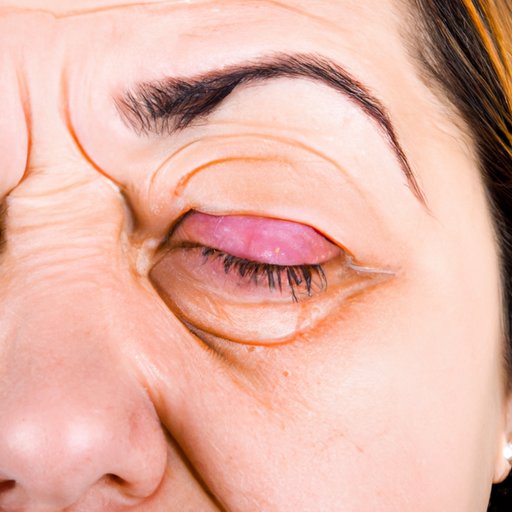
Introduction
A swollen eye is a condition where the eyes become puffy, red and sore due to various reasons. Swollen eyes can be caused by allergies, injury, and infections. This article will provide information on how to get rid of a swollen eye quickly through natural remedies and traditional medical treatments. This article is for those who are experiencing swollen eyes and are looking for natural remedies and medical treatments to alleviate the condition.
Understanding Swollen Eyes: Causes, Symptoms, and Treatments
Swollen eyes can be caused by a range of conditions, including exposure to allergens, injury, infection, and other underlying health conditions. Infections like pink eye or conjunctivitis can cause sore eyes, redness, and swelling. Additionally, allergies can manifest with swollen eyes due to an immune system reaction to allergens such as pollen, dust, or pet dander. Some eye injuries, like scratches, can cause redness and swelling as well.
The symptoms of swollen eyes are noticeable and uncomfortable. Symptoms include redness, itching, pain, and swelling. Traditional treatment methods involve the use of antibiotics and eye drops. Antibiotics can be used to treat underlying infections that cause swollen eyes. Eye drops are used to reduce inflammation and relieve symptoms.
6 Natural Remedies to Get Rid of a Swollen Eye Fast
These natural remedies for swollen eyes can be very effective in reducing swelling and relieving discomfort:
- Cucumber slices: Place cold cucumber slices over your closed eyes for at least 10 minutes. Cucumber contains antioxidants and flavonoids that can reduce swelling and tighten up the skin around the eyes.
- Tea bags: Place cold tea bags over your eyes, making sure they cover the affected area. Tea bags contain tannins that reduce swelling. Chamomile tea bags are recommended as they also have anti-inflammatory properties.
- Potatoes: Cut a potato into thin slices and keep them in the refrigerator before placing them on your eyes for 15 minutes. The natural anti-inflammatory properties of potatoes help reduce swelling and inflammation.
- Egg whites: Whip egg whites until they become thick. Apply the mixture to your swollen eye area for 15 minutes and rinse with cool water. The protein in egg whites has skin tightening properties that help reduce swelling.
- Aloe Vera Gel: Apply a thin layer of aloe vera gel on the swollen areas of your eyes before going to bed. Aloe vera gel contains antioxidants and anti-inflammatory properties that aid in quick healing of swollen eyes.
- Saline Solution: Take half a teaspoon of salt and add it to half a cup of water. Soak a cotton ball in the solution and apply it to your eyes for 10 minutes. The salt helps to reduce the inflammation and swelling around the eyes.
Ice or Warm Compress: Which Works Best for a Swollen Eye?
Both ice and warm compresses can be used to alleviate swelling. If the swelling is caused by allergies, a warm compress is recommended as it helps stimulate blood circulation in the affected area. If the swelling is caused by injury, a cold compress is recommended as it helps reduce the inflammation and swelling. Either way, it is essential to avoid using the compress for more than 20 minutes at a time.
Home Remedies to Try Before Seeking Medical Attention for a Swollen Eye
Before seeking medical attention, there are some home remedies you can try to help reduce swollen eyes:
- Gently massage: Gently massage the swelling area around your eyes with your fingers for a few minutes daily to promote lymphatic drainage.
- Take breaks from screen time: Avoiding prolonged exposure to computer screens, phones, and televisions reduces eye strain and prevents eye fatigue, which can lead to swollen eyes.
- Clean your eyes: If the swelling is due to allergies, ensure that you wash your eyes out regularly with saline solution or clean water.
- Avoid makeup: If the swelling is due to an allergic reaction, avoid using makeup that may aggravate the swelling.
- Stay hydrated: Drinking water regularly can help prevent dehydration, which can cause swollen eyes.
5 Common Triggers for a Swollen Eye and How to Avoid Them
A few of the most common triggers of swollen eyes and how to avoid them:
- Allergies: Avoiding exposure to common allergens such as pollen, dust, and pet dander can help reduce the likelihood of swollen eyes.
- Dehydration: Drinking enough water throughout the day can help prevent the dehydration that can lead to swollen eyes.
- Injuries: Wearing appropriate protective eyewear during activities that could lead to eye injuries can help prevent swollen eyes. Additionally, avoid rubbing your eyes if you have an eye injury.
- Dietary triggers: Certain types of food can trigger allergic reactions leading to swollen eyes. Common allergens include nuts, shellfish, and dairy products.
- Medical conditions: Certain medical conditions like sinusitis can cause swelling around the eyes. If you experience recurring swollen eyes, seek medical attention.
Swollen Eye Relief: Do’s and Don’ts for Quick Healing
Here are some Do’s and Don’ts for quick healing of swollen eyes:
- DO: Get enough sleep and rest as much as possible.
- DO: Apply gently pressure directly onto the affected area to help reduce swelling.
- DO: Use lubricating eye drops to relieve dryness and soothe the eyes.
- DON’T: Rub your eyes as it may lead to further irritation and swelling.
- DON’T: Wear contact lenses until your swollen eye has completely healed to reduce the risk of infection.
Conclusion
There are many natural and medical remedies for getting rid of swollen eyes. Some of these remedies include using natural ingredients such as cucumber slices, tea bags, and potatoes. In contrast, others may require medication such as antibiotics or eye drops. If you experience recurring swelling or symptoms, it is important to seek professional help from your doctor. Additionally, avoiding known triggers of swollen eyes can help prevent future occurrences. By using the guidelines provided, anyone can rid themselves of swollen eyes quickly and safely.




